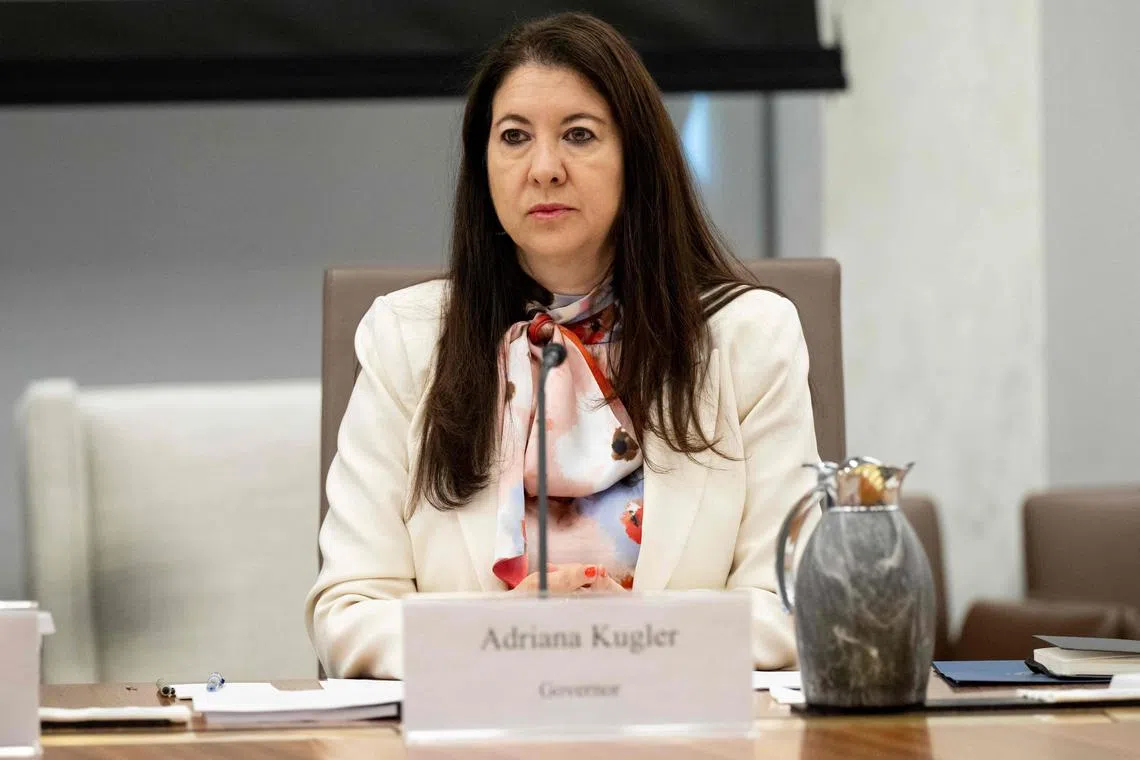Adriana Kugler resigning from US Fed, opening door to Trump appointment
Sign up now: Get ST's newsletters delivered to your inbox

Ms Adriana Kugler will exit the central bank on Aug 8, before the conclusion of her term.
PHOTO: AFP
- Fed governor Adriana Kugler is resigning early, effective August 8, 2024, and returning to Georgetown University in autumn.
- Trump will now nominate a new Fed governor, potentially influencing Fed leadership succession and challenging Fed independence.
- Kugler's departure occurs amidst heated rhetoric from Trump towards the Fed, who are currently holding interest rates steady.
AI generated
WASHINGTON - The Federal Reserve said on Aug 1 that governor Adriana Kugler is resigning early from her term and will exit the central bank on Aug 8, potentially shaking up what was already a fractious succession process for Fed leadership amid difficult relations with President Donald Trump.
The Fed said in a statement that Ms Kugler, who became a governor in September 2023, will leave before her term’s conclusion, which was scheduled for Jan 31, 2026.
In a press release, the Fed said Ms Kugler will return to Georgetown University as a professor next autumn.
Ms Kugler did not attend this week’s rate-setting Federal Open Market Committee meeting.
Ms Kugler’s early departure may shake up the timeline for the succession process now surrounding Fed chair Jerome Powell, whose term ends in May 2026.
The US president renewed his call for Mr Powell to resign on Aug 1.
“Powell should resign, just like Adriana Kugler, a Biden Appointee, resigned,” Mr Trump said in a post on Truth Social.
Mr Trump has threatened to fire Mr Powell
Mr Trump will now get to select a Fed governor to replace Ms Kugler and finish out her term.
Some speculation has centred on the idea Mr Trump might pick a potential future chair to fill that slot as a holding place.
The White House did not immediately respond to a request for comment about the Fed appointment, although Mr Trump said later he was happy to have an open slot to fill.
“I would not read any political motivation into what (Kugler is) doing, although the consequence of what she’s doing is she’s calling Trump’s bluff,” said Mr Derek Tang, an analyst at LH Meyer, a research firm.
“She’s putting the ball in his court and saying, look, you’re putting so much pressure on the Fed, and you want some control over nominees, well, here’s a slot.”
The mechanics of filling the soon-to-be open governor role have a number of moving parts that make it hard to say how Mr Trump will approach finding a replacement for Ms Kugler. Mr Tang noted the president could even fill the position temporarily with a recess appointment while the Senate, responsible for confirming Board of Governors officials, is not in session.
There’s also some uncertainty about what would happen to someone quickly confirmed to the role given that the term ends early in 2026, although some Fed observers noted a governor can stay in office in an expired term until a replacement has been confirmed.
Over recent days, Mr Trump’s rhetoric about the Fed has remained heated - he called Mr Powell on Aug 1 “a stubborn MORON” - but he appears to have backed away from his threats to fire the central bank leader.
Challenging term
In a letter to Mr Trump announcing her resignation, Ms Kugler wrote “I am proud to have tackled this role with integrity, a strong commitment to serving the public, and with a data-driven approach strongly based on my expertise in labour markets and inflation.”
Ms Kugler’s time at the Fed was a challenging one as central bankers raised rates aggressively to combat high inflation pressures. Those high rates have put them in the crosshairs of Mr Trump and have caused economic challenges, although inflation pressures have moved much closer to the central bank’s 2 per cent target.
At the FOMC meeting this week, the Fed maintained its interest rate target range at between 4.25 per cent and 4.5 per cent as policymakers stayed on the sidelines to see how Mr Trump’s aggressive regime of large import tax increases will affect the economy and inflation pressures.
Two Fed officials opposed that stance and wanted a rate cut, worried that risks to the job market are rising and that the inflation threat posed by tariffs is transient.
The Fed’s dissenters found some support for their concerns in the release on Aug 1 of weaker-than-expected jobs data
Some Fed officials who spoke on Aug 1 noted the report with concern but said they need to see more evidence the job market is running into trouble before changing their views on monetary policy.
Mr Trump reacted to the jobs data with a double-barrelled attack, hitting the Fed for not cutting rates while directing his staff to fire the commissioner
Mr Trump’s move rattled markets and raised questions about the future integrity of one of the most important statistical reports financial markets rely upon. REUTERS


